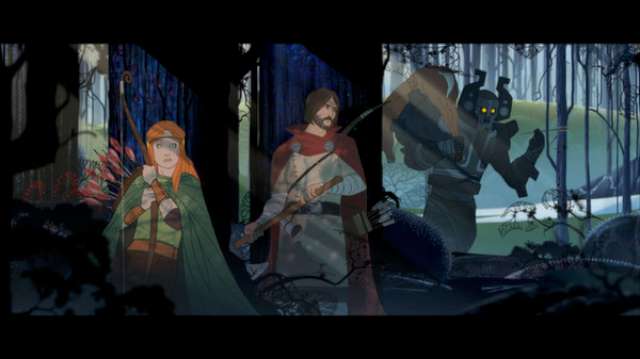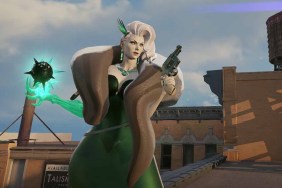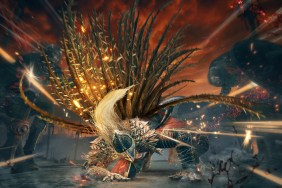Just sit right back and you'll hear a tale, a tale of a long-ass trip.
Role-playing video games, for the record according to Wikipedia, are games where the player controls the actions of a protagonist (or several adventuring party members) immersed in a fictional world, with origins in pen-and-paper gaming. Tactical turn-based games, on the other hand, are games designed to simulate the considerations and circumstances of operational warfare and military tactics. Fuse the two together and you have a tactical role-playing game, the genre where The Banner Saga resides. And while the game fulfills all the requirements for a tactical RPG, it clearly revels in the tactical half over the RPG half.
The Banner Saga opens with a screen informing the player that the choices made will influence the outcome of the story. Very Telltale-ish, to be sure; however, in a Telltale game such as The Walking Dead or The Wolf Among Us, key interactions are noted in the game (“Kenny will remember your loyalty.”). Though it may be too late to do anything about it, at least players know where NPCs stand with them. In The Banner Saga, though, conversational choices reveal almost nothing until the end of a dialogue, where one character gives a small smile or a smirk or some minute expression and your caravan earns rewards or punishments. If the intent was to replicate Telltale Game's system, the dialogue system should also give the same knowledge Telltale gives its players.
This also leads into a key component of The Banner Saga—death can be a permanent ailment. Now, don't fix your expressions of “Um, DUH!” on your screens just yet. Dying in other RPGs can be quickly fixed with a life-granting items, a curing spell, or a night's stay at an inn. The Banner Saga doesn't mess around with this—death is death. In fact, if a critical character dies, the entire story could shift to accommodate the death instead of bringing the character back to life.
At the outset, players begin as a group of varl, mighty horned giants left over from the time of the old gods, on a mission to collect tithes. (Nothing says “fun” like being a tax collector!) A short dialogue explains that the sun has inexplicably been stranded in the sky, causing perpetual twilight. Players are then launched into their first battle.
The battle system easily stands as one of the best features about The Banner Saga. It's easy to pick up and challenging to master. Your party fights on an isometric grid, and the tutorial walks players through the basics without being intrusive. It's in the battles that the team from Stoic (formerly of BioWare) sends their love to the tabletop gamer and the tactician—battles have a pen-and-paper feel to them without the need of a dungeon master. Prepare for a dash of realism, though; while many other RPG games have elements of magic, potions, and beasts of all creations, The Banner Saga revels in realism. Players won't find magic, and healing items are rare, with recovery instead requiring need for more supplies and a healthy spot of rest.
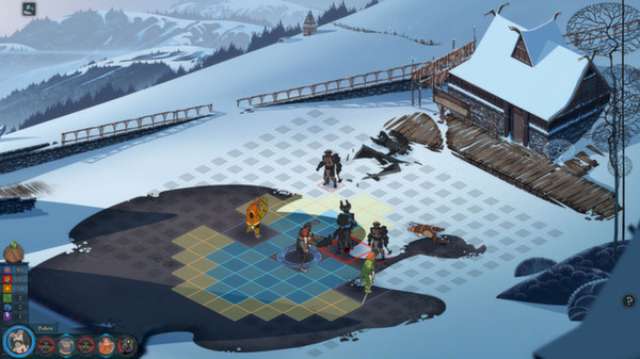
While your parties travel, encounters will take place along the road, sometimes resulting in battle, but oftentimes it's simply an encounter requiring a leadership choice. For example, at one point in another faction, you might be asked to handle a drunk causing problems in the camp. The various choices will be seen throughout the caravan and will determine group morale. Pleasing the caravan raises morale, sometimes at the cost of supplies; angering them or tiring them out lowers it. The higher the morale, the harder your crew fights in battle. Grinding is replaced by in-battle kills, via a system of renown, which oddly works as both your experience points and your currency, as renown will also help your party replenish supplies and buy charms and artifacts.
So far, players who like tactical games should be salivating at the chance to boot up Steam and download this title from Stoic Studios. Players looking for a more traditional RPG experience, however, may want to look elsewhere. The Banner Saga's tradition stems staunchly from tactical turn-based games, and many of the elements traditional RPG players look for are weakly present at best. Many RPG players long for deep, immersive worlds they can get lost and explore in, with rich, enveloping storylines to follow and be enthralled in.
But exploration is minimal to nonexistent, which is quite unfortunate as Stoic has created a beautiful, rich land tortured by permanent twilight. The art style takes inspiration from hand-drawn animation, a reminder of a certain age of Don Bluth animations found in games like Dragon's Lair and Space Ace.
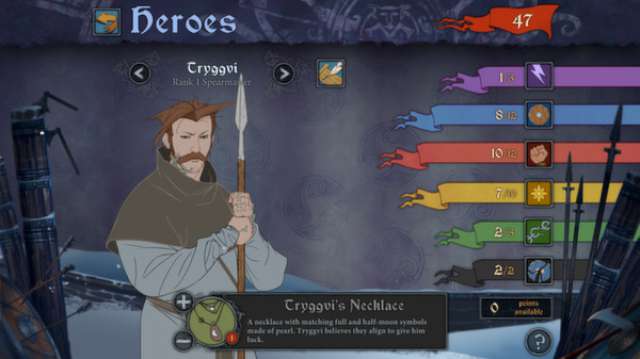
The storyline, by contrast, is as dull as watching rocks sit in the sun. To be fair, players who find fascination with military operations and warriors of old will take more away from it, but that aside,the characters rarely have personality and are difficult to care about. As mentioned, The Banner Saga begins on a tax collection journey of all things, and players are quickly introduced to other varl before being thrust in a battle. Afterward, a sniveling brat of a prince and his party make acquaintances and there's another battle. About the time players figure out who's who, the story then jumps to a new pair of people rushing to their hometown to warn them of an impending attack. These two are human, but no more interesting than any of the others. Apart from a segment with the archer Alette, most of the other plotlines march their way into boredom.
Though The Banner Saga is dull, it's not a bad game insomuch that it's just not for everyone. Players who like deep strategic gaming—the kind of players who spend many a night at a friend's house trying to convince everyone that everyone would have fun playing Risk, and no, it was sheer luck that they completely dominated the time before—will be very pleased. The battle system controls easily and is fairly easy to learn; those who see this game basically like chess will enjoy it. Those looking for a new RPG to get into, however, should look elsewhere.
-
Kickstarter title!
-
Beautiful, hand-drawn animations
-
Alette is a stand-out character
-
Battle system easy to learn but challenge to master
-
Gives something to all tactical game fans...
-
...but not to RPG fans.
-
Very linear, with little opportunity to explore
-
Not many interactions. Little animation, little voicework.
-
Story is dull, dull, <i>dull</i>.
